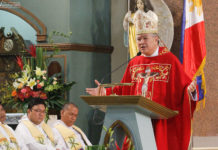THE UNIVERSITY prides itself as an institution that breeds National Artists but it is a shame that it does not have a cultural arm, an agency that promotes the artistic freedom of its students and formulates policies and programs to make arts and culture thrive in UST.
Unlike the University of the Philippines’ Office for the Initiatives in Culture and the Arts and De La Salle University’s Culture and Arts Office, UST lacks a center to formulate rules, regulations and student-centered programs that will boost arts and culture.
How do we expect to have a culturally literate student body if we do not have an office that will make the arts and humanities thrive on campus?
A cultural office will cultivate in every Thomasian the significance of the humanities and the arts in self-enrichment and social and cultural development. There is clearly a necessity for an office to house or coordinate cultural organizations, regulate the activities of performing arts organizations, formulate cultural policies and programs, and sponsor and sustain them.
The Office for Student Affairs (OSA), which has the mandate to regulate all student activities and university organizations, is not a suitable regulating body for the performing arts and other cultural organizations. OSA does not have the competence to screen the seasons and programs of performing arts and other cultural groups, much less to censor or veto them, as theater companies have complained. OSA through the decades has expanded the purview of its authority to cover all campus groups, including student-major societies and Greek-letter fraternities, succeeding in neither.
This school year, for example, OSA has withdrawn its recognition of all fraternities, practically penalizing them for following OSA rules compared with Aegus Juris, which, despite OSA suspension, managed to haze to death a neophyte.
In any case, theater companies and other performing arts groups hardly receive financial support from the OSA. Compared to the performing arts regime of other universities, many of them with hardly any track record in producing national artists, the UST theater and performing arts scene is woefully bland, even mediocre.
The lack of a cultural league is one of the reasons why we cannot produce excellent plays and A+ productions that we can truly call ours. It is ironic how we were able to hone outstanding theater actors but were never able to craft even a single notable play that is a product of Thomasian creativity.
UST officialdom invests millions in its varsity sports program and in medical education (the oldest and arguably the best in the country although the medical school is not an “earning” school).
But there’s hardly any holistic program at the humanities, arts, and culture, when in fact, as the oldest university in Asia, UST is also the oldest liberal arts school and the oldest institution in the humanities.
One could look at the state of disrepair and desuetude at the Conservatory of Music (a Center of Excellence in Music Education according to the Commission on Higher Education) to see how the UST administration prioritizes the arts and culture.
The neglect of the culture and the performing arts on campus is likewise in disconnect with UST’s target of producing “competent, committed, compassionate” Thomasians who are able to articulate their discipline, advocacy, and the Thomistic vision of Catholic education to reconcile faith and reason, religion and science, the sacred and the secular.
Human resources managers have observed that while UST applicants bring with them credible diplomas, they’re poor at communication skills.
This is the result of the abolition of Speech and Drama from the curriculum and the lack of incentives for students to develop their communication, artistic, and performing skills on campus.
It is high time for the University to create a cultural office that will bolster and inculcate in every Thomasian the power of art and the humanities. We students must demand what we need – a center that will discover talent, invest in potential and provide avenues for creative works.
The student body deserves a full-fledged cultural office that has credible administrators who can effectively help young talents and provide spaces for cultural and artistic enrichment.
It’s time for the UST administration to come up with a cultural arm that will provide a healthy environment for the breeding of the next generations of National Artists.













